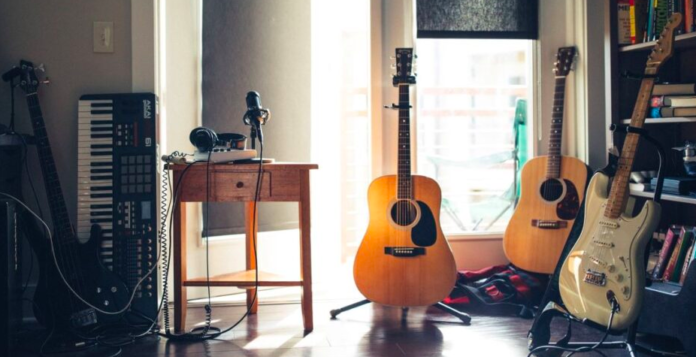Musical instruments, just like a car, require a lot of care and maintenance to last a long time. They are a beautiful thing to have. They can provide you with a good time filled with brilliant music and create beautiful memories. Musical instruments are an investment that can last a lifetime if properly maintained. Whether you are a musician or not, you would know that musical instruments need to be properly taken care of to preserve not only their aesthetics but also to avoid damaging the quality of the sound they make. When you store your musical instrument, there is the risk that the instrument will come to harm. But how to store musical instruments the proper way? Here is a simple guide for you to safely store your musical instruments in a self-storage unit.
Check the environment
Musical instruments are sensitive to extreme weather, so it’s critical that they aren’t kept in units prone to extreme hot or cold temperatures. A dark, cool, dry, and vibration-free spot is where they should be stored. You should really keep in mind that humidity is an extremely serious problem when it comes to musical instrument storage. High humidity can even warp or deform wood. Furthermore, extreme cold, dry temperatures can cause cracks in the instruments.
It’s really important to place your instruments on shelves or other items instead of on the unit’s floor. It’s recommended that you do not put anything on top of instrument cases, regardless of how light it appears. Make sure the instrument is in a place where it isn’t going to accidentally get knocked over by something else.
Clean and prepare the instruments
You can’t just pack up your instruments and put them in storage. You should first thoroughly clean them to remove any dirt, dust or debris that could damage them or shorten their life. You should also condition your instruments to keep them in good working order.
Likewise, relax the strings on guitars, violins or other stringed instruments, and condition drums with oil. For wood instruments such as saxophones, flutes, and clarinets, take them apart, remove any reeds and mouthpieces, and give them a thorough cleaning. When cleaning, use the proper products and cloths. Clean each segment of your instrument individually.
Disassemble before storage if possible
In order to keep musical instruments safe in storage, another important step you have to take is to disassemble them. Any instrument that can be separated into sections should be to prevent pressure on the joints. Take off mouthpieces, remove reeds, and detach straps. If you own a stringed instrument, lose the strings gently. Tight strings might cause your instrument to deform. However, there is no need to remove them altogether. Guitars and other stringed instruments with long necks should be placed upright to minimise the stress of gravity.
On the other hand, Piano strings do not need to be loosened since they are intended to endure high pressure. Drumheads should also be loosened.
Pack the instruments safely
It’s really important to avoid randomly storing your musical instruments in boxes. Before you proceed to store musical instruments, make they are clean and dry before packing them in their cases. Also, make sure the inside of the cases is clean and that they aren’t showing any signs of damage. For all instruments, a hard case is better than a soft one when storing for a long period of time. It will provide more protection from environmental influences, like UV light, moisture, or insects.
Instruments like drum sets and pianos normally do not come with cases because of their size and should be wrapped with a tarp to protect them from dust, pests, and humidity. You can even wrap the piano legs, pedals, and benches with heavy paddings.
It is recommended to place a sheet of acid-free paper or clean cloth over the instrument before closing the case. Cases should be kept off the floor on a pallet or shelving, away from vents and direct sunlight.
Storing drums
When it comes to storing drums, you should know that the sensors on your drum kit are sensitive to temperature fluctuations and humidity. If you are using leather drum skins, be sure to oil them before storage. This prevents them from drying out or cracking. While each drum needs an individual case, you thankfully only need one bag for your cymbals.
As part of the disassembly process, remove the hoops from either end of your drums. Then, wrap each of them in bubble wrap before placing it back on the drum. The last component of the drum set to think about is the hardware. You can store the hardware in a case designed specifically for it. You can stack the drum cases on top of each other to save space. However, you don’t want to stack them too high, as the structure might topple over.
Storing a piano
While a piano might be large, it’s also extremely delicate, so you’ll need to take extra special care in storing the piano in the perfect environment. The piano must be wrapped in several layers of protective cloth sheets followed by a layer of plastic film. The cleaner your piano is, the more likely it will be in a better condition when you take it out of storage.
Use a soft cloth or a feather duster to brush any dust off the cover and the keys. Be gentle, so you don’t scratch the surface of the piano. After thoroughly cleaning your instrument, you must protect it further with a piano protective cover. This will prevent scratches and nicks to your item during its storage. A dust protector or a white lint-free cloth that is soft and appropriately sized for your piano are good solutions for protecting your piano keys.
Storing string instruments
Before you put your instrument into storage, loosen the strings, but don’t make them too loose. The final goal here is to remove tension from the neck, which can warp it over time. The next important step is finding them a suitable case. This will keep your instruments protected from dust and accidental damage and ensures their colour and finish will remain in ideal condition.
Storing brass instruments
First of all, you need to take out all the slides and empty all the water. Next, wipe the slide legs clean. After that, empty all the water from the rest of the horn. The horn has to be as dry as possible. You need to really break the instrument apart, polish it, clean it inside with a cleaning brush, use tissue paper between the valves, and be prepared to replace wood and cork.
Storing woodwind instruments
Breaking down your woodwind instrument is critical to maintaining it while it’s stored. This relieves pressure on the instrument’s joints and prevents damage from occurring. Take apart any reeds or mouthpieces, and don’t leave straps on the instruments. Clean exposed wood pieces and put them in a polyurethane bag.
Rent a climate-controlled storage unit
Temperature and humidity can wreak havoc with instruments. Conditions such as prolonged exposure to extreme heat or cold and humidity can have devastating effects on musical instruments, such as mould and mildew growth, warping, cracking, and other great structural issues. Musical instruments of all types do well in temperatures around 70 degrees Fahrenheit and at humidity levels ranging between 40 and 60 percent.
Maintaining stored musical instruments
Once you’ve thoroughly cleaned, wrapped, and packed your musical instruments, you can now store them in the self-storage unit. But you should definitely check in on them from time to time.
If you’re storing a wood or wood-panelled instrument without a case, you should inspect it regularly for insect damage. If you see any signs of damage, such as warping, cracking of joints, mould, discolouration, corrosion, or other, take your instrument to a professional repair shop immediately for a diagnosis. The sooner you catch the damage, the easier it will be to fix.
Conclusion:
Musical instruments are an investment, so it’s important that they’re cared for even if you’re not going to be using them for a while. When the time comes to place them in storage, pick a unit that provides the perfect features, such as climate control and great security. And if you follow these easy steps, you can be sure that your instruments will be safe and sound.











